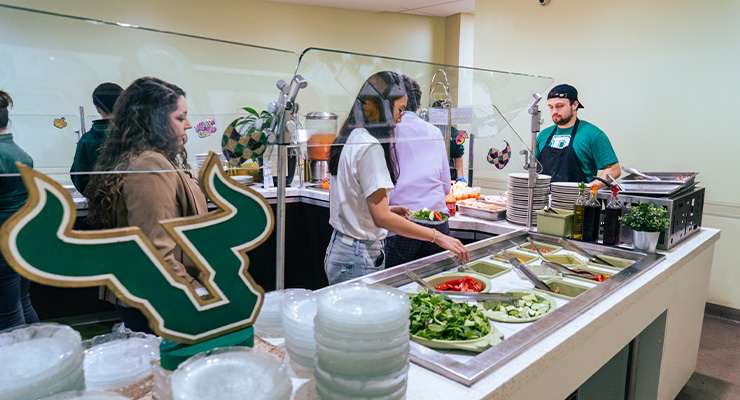How to Balance Schoolwork and a Job in College
By Emily Young | Last Updated: Mar 5, 2025

Planning to work while in college? You’re in good company.
“About 74% of part-time undergraduate students and 40% of full-time students in the U.S. were employed in 2020,” according to federal data from the National Center for Education Statistics. Besides the obvious perk (a paycheck!), having a job in college can yield big benefits:
- You’re likely to graduate with less debt.
- You’ll gain valuable experience, skills, and career connections.
- You’ll be more likely than your nonworking classmates to graduate (so long as you work a reasonable number of hours).
But it’s not always easy to juggle being a student and an employee at the same time — not to mention trying to have a social life. That’s why we reached out to both Lesa Shouse, director of career services for USF St. Petersburg, and Naomi Vaid, a USF student worker majoring in information science. Their first-hand knowledge and experience can help you avoid burnout while you balance schoolwork and a college job.
Choose a Job that Interests You
If you’re in the market for a job, your first stop should be your university’s career center. Career counselors can connect you to jobs that match your interests — which means you won’t just be making money, you’ll also be furthering your professional goals.
Vaid wants to work as an artificial intelligence developer or tester, because she’s fascinated with the idea of “how we can personify a computer.” That’s why, in her freshman year, she worked as a USF student chat bot developer.
“My boss taught me all the behind-the-scenes of how a chat bot is even made and the coding that goes into it,” she says. “You can change the personality of your chat bot — some chat bots can be coded to be friendly and some can be coded to be very sassy.”
Now, in her junior-year job as a USF student data analyst, she’s practicing the skills that she’ll need to succeed at a big tech company someday. Although her classes have taught her a lot, she says “nothing compares to real-life experience” you can gain on the job.

Pursue On-Campus Opportunities
“Working on campus is the best opportunity for students because you are a student worker, meaning you are a student first,” explains Shouse. “A lot of times, the offices or departments you’re working for are more likely to be a little more lenient if you’ve got a big test coming up the next day because they understand academics need to come first.”
This has been Vaid’s experience at USF: “I’ve gotten really lucky with the bosses that I have; they’re very understanding.”
How do you find these understanding bosses? Shouse shared a few tips:
- Look for university jobs, like federal work study opportunities or on-campus temporary student employment.
- Consider on-campus employers who aren’t affiliated with the university — like food services, bookstores or credit unions — but who still understand the demands of higher-ed life.
- Find an off-campus employer who’s familiar with the university and willing to offer a school-friendly schedule.
On-campus jobs can be competitive, so give yourself the best chance of landing one:
- Get your resume reviewed. You can do this at USF's career services center.
- Practice your interviewing skills. “Sometimes an on-campus job interview is the first interview a student’s ever had,” Shouse says. At USF’s career center, you can practice mock interviews one-on-one with a career counselor or use a virtual platform that gives you AI feedback on everything from eye contact to filler words.
- Borrow a standout business outfit from your school’s career closet. That way, you can make a great first impression without spending any money.
Get the Support You Need
Keep in mind that how much you work matters. Although students who work between 15 to 20 hours a week tend to perform better in school than their nonworking peers, more hours than this can lower your grades. But sometimes you’ve got to work extra hours to make ends meet. If that’s your situation, take advantage of your school’s resources:
- An academic advisor can suggest more flexible course options (like online, hybrid, or evening classes), help you decide how many courses to take, and make sure you’re on track for graduation.
- The financial aid office can make sure your job income won’t negatively affect your financial aid eligibility.
- The learning center can help you fine-tune your study skills and ensure you’re working smarter, not harder.
- Financial education programs — like Bull2Bull at USF — can help you address financial challenges and make the most of your resources.
Practice Clear Communication
You probably don’t want to stay in your college job forever, so “prioritizing classes over that job is important,” Shouse says. For example, when you have a big exam coming up, you might need to lighten your work hours. Try to communicate with your bosses in advance rather than calling out of work last minute. You can say something like, “I anticipate the next three weeks will be especially busy for me because I’m studying for midterms.”
“I’ve learned that you have to communicate if you're struggling with anything,” Vaid says. “Being transparent and not pretending like everything’s okay is very necessary.”
If you’re worried about having a sensitive conversation with your boss, you can role-play it with your career counselors first. “We talk to (students) individually about what their experience with their supervisor is like … (and we) help them work through the process,” Shouse says.

Master Time Management
Vaid has a lot on her plate. She works 20 hours a week and is taking four classes this semester. Plus, Vaid is part of the STEM sorority Alpha Sigma Kappa and founded the club GenConnect, which helps senior citizens learn about daily technology like texting and cyber security.
“When it comes to time management, I like to be realistic with my goals,” Vaid says. “Before, when I would create my schedule for the day, I would put a lot of different things to do in a short amount of time and that would make me get burned out really fast. I realized it’s okay to take time in doing things — you have to make sure you’re doing it efficiently and you’re not rushing through it.”
Vaid likes to create weekly and daily schedules for herself, but she’s learned to be flexible. “Every week, college is never going to look the same,” she explains. “I tried to have the exact same schedule for every week, but it would never work that way, especially with extracurriculars and club activities.”
When you do carve out time for a study session, these time management strategies can help you make the most of it:
- Eat the frog first: Get more challenging assignments out of the way before tackling easier projects.
- Study at your best: Try to schedule study hours when you’re at your brightest, whether you’re a morning person or a night owl.
- Practice the Pomodoro method: Take a five-minute break every 25 minutes, and take a 30-minute break every hour. During your half-hour break, fit in something healthy and relaxing, like a short walk around your apartment complex or a quick shower.
Take Care of Yourself
When you’re short on time, it’s easy to stop caring for your health. But this isn’t a corner you should cut. Staying healthy will actually make you more productive in the long run:
- Schedule a yearly physical. This will help you catch (and treat) any underlying problems before they start affecting your work/school. And if you feel unwell, be sure to visit your university’s health care center. At USF, registered students only have to pay minimal fees for specialty care, even if you don’t have insurance, making it an affordable way to stay healthy.
- Get plenty of sleep. You may be tempted to pull frequent all-nighters, but remember that you need at least seven hours of sleep to function. “Staying up late to study or finish work can negatively impact your focus and productivity,” explains the Harvard Business School.
- Stay up-to-date with COVID-19 boosters and flu vaccines. You may have mild side effects for a day or two, but it’s much better than having to take a sick week or being sidelined with long Covid. If there’s a lot of COVID-19 or flu activity around, you might also consider donning a mask in crowded indoor areas.
- Visit your school’s counseling center. Not only can counseling help you manage symptoms like anxiety and depression — which are common for college students — it can also boost your academic performance.
To avoid burnout, make sure you schedule time for fun, too. If she doesn’t have an exam coming up, Vaid dedicates Sunday afternoons or Friday nights to self-care or hanging out with friends. Self-care can be simple: for Vaid, it looks like “taking the longest shower of the week” and reading an inspirational book she’s picked up at the USF Barnes & Noble bookstore.
Choose a School Invested in Your Success
When Vaid got her first college job, she was nervous about whether she could do it all. “Luckily, I’ve been able to keep a balance,” she says. “And honestly, finding a balance between school and work has also been a skill … in itself.”
A good university can help you find that balance and give you the support you need to succeed. USF, for example, provides tons of resources for students — from career services to mental health counseling, and individualized academic advising to generous financial aid. It’s no wonder USF has been nationally recognized for its accomplishments in student success — our number one strategic goal. Reach out to the Office of Admissions online to find out how we can help you thrive academically and professionally.


